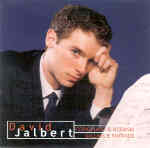There seems to be no lack of young pianists coming out of the woodwork, all of them hell-bent on playing contemporary music beautifully. Such is the case with David Jalbert, a 25-year-old Quebec native whose teachers include Jerome Lowenthal and Ursula Oppens. Judging from his performances of John Corigliano’s two large-scale solo works and Frederic Rzewski’s formidable North American Ballads, Jalbert appears to be able to do anything he wants at the piano. He makes the difficult alterations of fifths and thirds in the central movement of Corigliano’s Etude Fantasy sound utterly easy, and he suavely navigates Fantasia on an Ostinato’s polytextural layers. Jalbert casts delicately wrought hazes over the latter’s central “minimalist” section that contrast to Hélène Grimaud’s leaner, more rhythmically incisive treatment.
To my ears, though, the Etude Fantasy speaks with more character and tonal variety in the hands of James Tocco on Sony, and better still, Stephen Hough’s premiere recording on Hyperion. Compare, for example, Hough’s superior control over the “Ornaments” Etude’s soft trills and lighter, suppler touch in the opening “For the Left Hand Alone” Etude to Jalbert’s more generalized execution. Hough’s sophisticated voicings and altogether faster tempo also render the concluding “Melody” Etude in more shapely fashion.
If Jalbert’s penchant for pianistic beauty and refinement suits Corigliano’s idiom, it seems arguably miscast in the Rzewski works. Rzewski’s thematic material derives from folk and protest songs, and these tunes make their most persuasive effect when played straight. Jalbert tends to round them off in the manner of Chopin’s bel canto-inspired melodies (particularly in Dreadful Memories and Down By The Riverside) and he also softens the defiant accents and spiky dissonances throughout Which Side Are You On. Unlike Paul Jacobs (Nonesuch) and Kathleen Supové (CRI), who chose not to improvise a cadenza at the latter’s conclusion, Jalbert takes up Rzewski’s option. The pianist keeps up the churning momentum of Winnsboro Cotton Mill Blues’ opening section, but energy flags as his basic tempo gets slightly but noticeably slower. In other words, his reading yields to Supové’s ferocity, Marc-André Hamelin’s unshakeable rhythm, Anthony de Mare’s crisp articulation, and Rzewski’s elemental force. I hasten to add, however, that both composers praise Jalbert’s efforts on their behalf. Even if I do take issue with Jalbert’s interpretations at times, I acknowledge his unquestionable talent and instrumental mastery and plan on following his career.
































